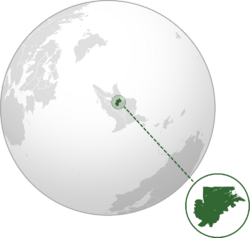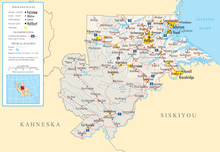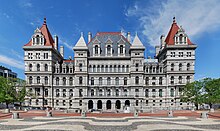Josephinia: Difference between revisions
mNo edit summary |
mNo edit summary |
||
| Line 50: | Line 50: | ||
|sovereignty_type = Independence | |sovereignty_type = Independence | ||
|sovereignty_note = from [[Fallish Empire|Falland]] | |sovereignty_note = from [[Fallish Empire|Falland]] | ||
|established_event1 = [[ | |established_event1 = [[Elian Wars of Independence]] | ||
|established_date1 = 15 June 1759 | |established_date1 = 15 June 1759 | ||
|established_event2 = [[Treaty of Lisieux]] | |established_event2 = [[Treaty of Lisieux (1776)|Treaty of Lisieux]] | ||
|established_date2 = 2 August 1776 | |established_date2 = 2 August 1776 | ||
|established_event3 = [[First Steader War]] | |established_event3 = [[First Steader War]] | ||
| Line 100: | Line 100: | ||
'''Josephinia''', officially the '''Commonwealth of Josephinia''' ({{wp|Osage language|Ínts’o}}: 𐒿𐓂͘𐓄𐒰 𐓀𐒰͘𐓓𐒰͘ 𐓁𐒻 𐓓𐓎𐓊𐒷, <small>{{wp|romanization|hernicized}}:</small> ''Sopʼa Mąžą Ni Žucʼe''), is a {{wp|sovereign state}} in [[Elia Borealis]]. It is bounded to the north by [[X]], to the west and southwest by [[Kahneska]], to the southeast by [[Siskiyou]], and to the east by the [[Alconian Ocean|Northern Alconian Ocean]]. Its {{wp|capital city|capital}} is [[Haliburt]] while its largest city is [[Port Royal, Josephinia|Port Royal]]; other major population centers include [[Delamore]], [[Gracebridge, Josephinia|Gracebridge]], [[Sequaneake]], [[Providence, Josephinia|Providence]], [[Fairview, Josephinia|Fairview]], [[Hamill, Josephinia|Hamill]], [[Pembroke, Josephinia|Pembroke]], and [[Springfield, Josephinia|Springfield]]. With a population of approximately 6.3 million, it is the [[Elia Borealis|fifth-most and least populous country]] in Elia Borealis, but its [[Elia Borealis|most densely populated]]. Josephinia spans 101,827 km<sup>2</sup> (39,316 sq mi), making it the [[Elia Borealis|single-smallest country]] on the continent and among the smallest in the [[Elias]]. | '''Josephinia''', officially the '''Commonwealth of Josephinia''' ({{wp|Osage language|Ínts’o}}: 𐒿𐓂͘𐓄𐒰 𐓀𐒰͘𐓓𐒰͘ 𐓁𐒻 𐓓𐓎𐓊𐒷, <small>{{wp|romanization|hernicized}}:</small> ''Sopʼa Mąžą Ni Žucʼe''), is a {{wp|sovereign state}} in [[Elia Borealis]]. It is bounded to the north by [[X]], to the west and southwest by [[Kahneska]], to the southeast by [[Siskiyou]], and to the east by the [[Alconian Ocean|Northern Alconian Ocean]]. Its {{wp|capital city|capital}} is [[Haliburt]] while its largest city is [[Port Royal, Josephinia|Port Royal]]; other major population centers include [[Delamore]], [[Gracebridge, Josephinia|Gracebridge]], [[Sequaneake]], [[Providence, Josephinia|Providence]], [[Fairview, Josephinia|Fairview]], [[Hamill, Josephinia|Hamill]], [[Pembroke, Josephinia|Pembroke]], and [[Springfield, Josephinia|Springfield]]. With a population of approximately 6.3 million, it is the [[Elia Borealis|fifth-most and least populous country]] in Elia Borealis, but its [[Elia Borealis|most densely populated]]. Josephinia spans 101,827 km<sup>2</sup> (39,316 sq mi), making it the [[Elia Borealis|single-smallest country]] on the continent and among the smallest in the [[Elias]]. | ||
Josephinia is located on the middle section of the [[Elian Alconian Plain]], the {{wp|foothill}} region of the [[Abaroskine Mountains]] which crosses the country diagonally from north-west to south-east; the adjacent [[Big Misty Mountains (Teleon)|Big Misty Mountains]] form the natural boundary to Kahneska. The centrally located [[Golden Valley (Teleon)|Golden Valley]] is the country's {{wp|breadbasket}} and most fertile region. The densely populated coastal areas around [[Sequaneake Bay]] are largely shaped by {{wp|ria|drowned river valleys}}, low {{wp|fjord|firth}}s, and {{wp|tidal marsh|tidal marshes}} known as the [[Tidewash]]. | Josephinia is located on the middle section of the [[Elian Alconian Plain]], the {{wp|foothill}} region of the [[Abaroskine Mountains]] which crosses the country diagonally from north-west to south-east; the adjacent [[Big Misty Mountains (Teleon)|Big Misty Mountains]] form the natural boundary to Kahneska. The centrally located [[Golden Valley (Teleon)|Golden Valley]] is the country's {{wp|breadbasket}} and the most fertile region. The densely populated coastal areas around [[Sequaneake Bay]] are largely shaped by {{wp|ria|drowned river valleys}}, low {{wp|fjord|firth}}s, and {{wp|tidal marsh|tidal marshes}} known as the [[Tidewash]]. | ||
Various {{wp|indigenous people of the Americas|native Elian tribes}} have inhabited the territory of modern-day Josephinia for at least 11,000 years, including the [[Polhetan]] and the eastern [[Ama]]. In 1515, [[Falland|Fallish]] | Various {{wp|indigenous people of the Americas|native Elian tribes}} have inhabited the territory of modern-day Josephinia for at least 11,000 years, including the [[Polhetan]] and the eastern [[Ama]], and occasional [[Yingok|Yinese]] expeditions throughout the 14th century pioneered Elian exploration. In 1515, [[Falland|Fallish]] discoverer [[Francis Edward Barpfylde]] became the first known [[Calesia]]n to make landfall in the region. Subsequently, in 1608, the [[United Wixdon Company]] created the [[Colony of Cisylvania]] around the trading posts of Port Royal and Delamore as the second permanent [[Fallish Empire|Fallish colony]] in the {{wp|New World}} after [[Fastings, Free States|Fastings]] in [[X]]. Renamed in 1702, the inhabitants of now Josephinia fought for {{wp|independence}} in the [[Elian Wars of Independence]] beginning in 1759 and became part of the [[Grand Federation (Teleon)|Grand Federation]] in 1790. | ||
Dissatisfied with Fallish authority in Calesia, religiously prosecuted [[Cowerer]]s and other minorities flocked to Josephinia en masse in the late 18th century, nearly quadrupling the state's population | Dissatisfied with Fallish authority in Calesia, religiously prosecuted [[Cowerer]]s and other minorities flocked to Josephinia en masse in the late 18th century, nearly quadrupling the state's population within the span of 20 years. By 1800, the so-called [[Steaders (Teleon)|Steaders]] had repeatedly violated the [[Proclaimed Demarcation Line of 1750]] and began to {{wp|settler colonialism|settle and colonize}} the continent's interior from the eastern {{wp|frontier}}; the native populations were, often times violently, displaced. Following [[First Steader War|an armed rebellion]] in the mid-1880s, the weakening Grand Federation recognized the approximately 90,000 Steaders' independence beyond the Big Misty Mountains through the 1889 [[Casper Convention]]. The [[Elian Civil War]] coincided with [[Second Steader War|a final attempt]] by the Free States to seize back control over Josephinia, before such desires permanently ceased and the Grand Federation was dissolved. | ||
Over the course of the 20th century, Josephinia was subject to an alternating series of civil and {{wp|democracy|democratic}} governments and {{wp|military junta}}s; the near century-long {{wp|one-party rule}} of the [[National Party of Josephinia|National Party]] dominated Josephinian politics, gradually strengthening {{wp|racial segregation}} while rapidly {{wp|industrialization|industrializing}} the formerly {{wp|protectionism|protectionist}} {{wp|agriculture|agrarian}} [[Economy of Josephinia|economy]]. In [[1920 Josephinian coup d'état|1920]] and [[1944 Josephinian coup d'état|1944]], the [[Armed Forces of Josephinia|military]] repeatedly seized control. Amidst mounting international {{wp|sanctions}} by its continental neighbors, Josephinia's [[Constitution of Josephinia|amended constitution]] formally abolished racially motivated hindrances for the native population in 1977 and initiated a process of {{wp|democratization}}. | Over the course of the 20th century, Josephinia was subject to an alternating series of civil and {{wp|democracy|democratic}} governments and {{wp|military junta}}s; the near century-long {{wp|one-party rule}} of the [[National Party of Josephinia|National Party]] dominated Josephinian politics, gradually strengthening {{wp|racial segregation}} while rapidly {{wp|industrialization|industrializing}} the formerly {{wp|protectionism|protectionist}} {{wp|agriculture|agrarian}} [[Economy of Josephinia|economy]]. In [[1920 Josephinian coup d'état|1920]] and [[1944 Josephinian coup d'état|1944]], the [[Armed Forces of Josephinia|military]] repeatedly seized control. Amidst mounting international {{wp|sanctions}} by its continental neighbors, most notably by Kahneska, Josephinia's [[Constitution of Josephinia|amended constitution]] formally abolished racially motivated hindrances for the native population in 1977 and initiated a process of societal {{wp|democratization}}. | ||
A {{wp|developed country}}, Josephinia ranks highly in international measures of {{wp|Human Development Index|quality of life}}, {{wp|human rights}}, and suppressed {{wp|corruption}}, but still retains a significant {{wp|economic inequality}} between the white and native populations. Nationally, {{wp|legislature|legislative}} power is vested in the {{wp|unicameralism|unicameral}} [[National Parliament of Josephinia|National Parliament]], while {{wp|executive}} power is exercised by the [[President of Josephinia|President]] heading the [[Politics of Josephinia|Government]]. Josephinia is a member state of the [[United Congress (Teleon)|United Congress]], [[Organization of Elian States]], [[Fallish Community]], [[Alconian Forum]], and the [[X]], and it enjoys particularly close relations [[Falland–Josephinia relations|with Falland]] and [[Free States–Josephinia relations|with the Free States]]. | A {{wp|developed country}}, Josephinia ranks highly in international measures of {{wp|Human Development Index|quality of life}}, {{wp|human rights}}, and suppressed {{wp|corruption}}, but still retains a significant {{wp|economic inequality}} between the white and native populations. Nationally, {{wp|legislature|legislative}} power is vested in the {{wp|unicameralism|unicameral}} [[National Parliament of Josephinia|National Parliament]], while {{wp|executive}} power is exercised by the [[President of Josephinia|President]] heading the [[Politics of Josephinia|Government]]. Josephinia is a member state of the [[United Congress (Teleon)|United Congress]], [[Organization of Elian States]], [[Fallish Community]], [[Alconian Forum]], and the [[X]], and it enjoys particularly close relations [[Falland–Josephinia relations|with Falland]] and [[Free States–Josephinia relations|with the Free States]]. | ||
Revision as of 10:46, 5 September 2024
This article is incomplete because it is pending further input from participants, or it is a work-in-progress by one author. Please comment on this article's talk page to share your input, comments and questions. Note: To contribute to this article, you may need to seek help from the author(s) of this page. |
Commonwealth of Josephinia 𐒿𐓂͘𐓄𐒰 𐓀𐒰͘𐓓𐒰͘ 𐓁𐒻 𐓓𐓎𐓊𐒷 Sopʼa Mąžą Ni Žucʼe (Ínts’o) | |
|---|---|
| Motto: Ex Unitate Vires (Hernician) "Unity is Strength" | |
| Anthem: "Land of Old and Plenty"
| |
 Location of Josephinia in Elia Borealis (dark green) | |
| Capital | Haliburt |
| Largest city | Port Royal |
| Official languages | Fallish |
| Recognised regional languages | Ínts’o Polhetan |
| Ethnic groups | 54.6% Native 28.5% White 9.1% Mixed 2.0% Yinese 5.8% others |
| Religion |
1.2% Tahir 4.5% others |
| Demonym(s) | Josephinian Josephine |
| Government | Unitary presidential constitutional republic |
| Lloyd Gladstone | |
| Trygve Kapal | |
| Gwen Youngkin | |
| Legislature | National Parliament |
| Independence from Falland | |
| 15 June 1759 | |
| 2 August 1776 | |
| 27 October 1884 | |
| 12 September 1889 | |
| 5 January 1893 | |
| 9 February 1977 | |
| Area | |
• Total | 101,827 km2 (39,316 sq mi) |
• Water (%) | 3.3% |
| Population | |
• December 2023 estimate | 6,395,096 |
• 2022 census | 6,378,935 (14th) |
| GDP (PPP) | 2023 estimate |
• Total | |
• Per capita | |
| GDP (nominal) | 2023 estimate |
• Total | |
• Per capita | |
| Gini (2023) | low |
| HDI (2021) | very high |
| Currency | Josephinian guilder (Jƒ, JSG) |
| Time zone | UTC+4 (Eastern Elian Time, EET) |
| Date format | dd/mm/yyyy (CE) |
| Driving side | left |
| Calling code | +76 |
| Internet TLD | .js |
Josephinia, officially the Commonwealth of Josephinia (Ínts’o: 𐒿𐓂͘𐓄𐒰 𐓀𐒰͘𐓓𐒰͘ 𐓁𐒻 𐓓𐓎𐓊𐒷, hernicized: Sopʼa Mąžą Ni Žucʼe), is a sovereign state in Elia Borealis. It is bounded to the north by X, to the west and southwest by Kahneska, to the southeast by Siskiyou, and to the east by the Northern Alconian Ocean. Its capital is Haliburt while its largest city is Port Royal; other major population centers include Delamore, Gracebridge, Sequaneake, Providence, Fairview, Hamill, Pembroke, and Springfield. With a population of approximately 6.3 million, it is the fifth-most and least populous country in Elia Borealis, but its most densely populated. Josephinia spans 101,827 km2 (39,316 sq mi), making it the single-smallest country on the continent and among the smallest in the Elias.
Josephinia is located on the middle section of the Elian Alconian Plain, the foothill region of the Abaroskine Mountains which crosses the country diagonally from north-west to south-east; the adjacent Big Misty Mountains form the natural boundary to Kahneska. The centrally located Golden Valley is the country's breadbasket and the most fertile region. The densely populated coastal areas around Sequaneake Bay are largely shaped by drowned river valleys, low firths, and tidal marshes known as the Tidewash.
Various native Elian tribes have inhabited the territory of modern-day Josephinia for at least 11,000 years, including the Polhetan and the eastern Ama, and occasional Yinese expeditions throughout the 14th century pioneered Elian exploration. In 1515, Fallish discoverer Francis Edward Barpfylde became the first known Calesian to make landfall in the region. Subsequently, in 1608, the United Wixdon Company created the Colony of Cisylvania around the trading posts of Port Royal and Delamore as the second permanent Fallish colony in the New World after Fastings in X. Renamed in 1702, the inhabitants of now Josephinia fought for independence in the Elian Wars of Independence beginning in 1759 and became part of the Grand Federation in 1790.
Dissatisfied with Fallish authority in Calesia, religiously prosecuted Cowerers and other minorities flocked to Josephinia en masse in the late 18th century, nearly quadrupling the state's population within the span of 20 years. By 1800, the so-called Steaders had repeatedly violated the Proclaimed Demarcation Line of 1750 and began to settle and colonize the continent's interior from the eastern frontier; the native populations were, often times violently, displaced. Following an armed rebellion in the mid-1880s, the weakening Grand Federation recognized the approximately 90,000 Steaders' independence beyond the Big Misty Mountains through the 1889 Casper Convention. The Elian Civil War coincided with a final attempt by the Free States to seize back control over Josephinia, before such desires permanently ceased and the Grand Federation was dissolved.
Over the course of the 20th century, Josephinia was subject to an alternating series of civil and democratic governments and military juntas; the near century-long one-party rule of the National Party dominated Josephinian politics, gradually strengthening racial segregation while rapidly industrializing the formerly protectionist agrarian economy. In 1920 and 1944, the military repeatedly seized control. Amidst mounting international sanctions by its continental neighbors, most notably by Kahneska, Josephinia's amended constitution formally abolished racially motivated hindrances for the native population in 1977 and initiated a process of societal democratization.
A developed country, Josephinia ranks highly in international measures of quality of life, human rights, and suppressed corruption, but still retains a significant economic inequality between the white and native populations. Nationally, legislative power is vested in the unicameral National Parliament, while executive power is exercised by the President heading the Government. Josephinia is a member state of the United Congress, Organization of Elian States, Fallish Community, Alconian Forum, and the X, and it enjoys particularly close relations with Falland and with the Free States.
Etymology

The name of "Josephinia" is derived from the middle name of Princess Louise Josephine of Robindy, daughter of X. It was initially conceived as a gift to honor the royal princess for her 25th birthday in 1704, who had previously demonstrated a great personal interest in the indigenous cultures of the New World. It was eventually adopted by the Republic of Josephinia of 1884 when it declared its independence and ultimately remained.
Before the name change, the colony itself was initially named Cisylvania by Fallish colonial governor Edward Mary Dollingham of the United Wixdon Company in 1608, from the Hernician words for "on the same side as" (cis-) and the accusative case of "forest" (silva, sylvam; also meaning "woods"), literally meaning "on this side of the forest".
To refer to this country, the Josephinian government uses the terms Josephinia, Commonwealth of Josephinia, and Josephine Commonwealth.
History
Prehistory
Denvsoqua period
Fallish colonization
Steader migration
Independence
Cobtemporary period
Geography
Climate
Biodiversity
Government and politics
Josephinia is a unitary presidential representative democracy, as codified and set by its Constitution. Exercising the separation of powers, the country's political system is divided into the executive, legislative, and judicial branch, each controlled by a separate institution. Formally and de jure, the President is the head of the executive branch and, therefore, the head of state and head of government, the commander-in-chief of the armed forces, and the most influential political instance in Josephinian politics. The President is responsible for appointing a cabinet of ministers and has the responsibility to sign and veto bills. The current President is Lloyd Gladstone since 2022.
The unicameral National Parliament is the unified legislature. It is directly elected using the mixed-member proportional representation and parallel voting systems with plurality vote in single-member districts. The National Parliament can make national law, issue a state of war and taxation, and approve of the national budget and the ministers nominated by the President. It has 149 voting members elected to four-year terms; at least one third of the candidates presented by the parties must have native heritage.
The judiciary is embodied in the Supreme Court, the nation's highest court of appeal and comprised of 10 judges nominated by the President and approved by the National Parliament. It is the country's official source of law and protector of the Constitution, enabled to overturn bills that it deems unconstitutional. The political system is laid out by the frameworks of the supreme constitutional document last amended in 1977. Essential concepts of the system, such as the unitary structure, respect for human rights, and the rule of law are protected by a status of perpetual validity. Direct democracy is supported through the availability of protests, referenda, a multi-party system and accountancy of the government, and guaranteed freedoms of expression, assembly, secret ballot, and universal suffrage beginning at age 18.
In Josephinia's political history, the respective catch-all parties of the right-wing National Party and the left-wing Labour Party as well as its predecessors have been the dominant parties, with almost every President to date having been a member of either.
Foreign relations
Military
Law
Administrative divisions
Economy
Infrastructure
Agriculture
Mining
Tourism
Demographics
Languages
Religion
Education
Health
Cities and towns
Largest cities in Josephinia
National Census Office estimates (2021) | |||||||||
|---|---|---|---|---|---|---|---|---|---|
| Rank | Region | Pop. | Rank | Region | Pop. | ||||
 Port Royal  Haliburt |
1 | Port Royal | Port Royal | 734,732 | 11 | Aconahee | Pequennock | 82,752 | Delamore  Sequaneake |
| 2 | Haliburt | Haliburt | 314,503 | 12 | Durhamsburg | Haliburt | 75,208 | ||
| 3 | Delamore | Sequaneake | 245,590 | 13 | Oxcross | Treaty | 63,597 | ||
| 4 | Sequaneake | Sequaneake | 225,428 | 14 | Kingston | Haliburt | 61,410 | ||
| 5 | Providence | Providence | 181,172 | 15 | Namtahala | Abaroskine | 49,045 | ||
| 6 | Gracebridge | Pequennock | 160,338 | 16 | Fort Scott | Pequennock | 45,097 | ||
| 7 | Fairview | Golden Valley | 127,650 | 17 | Rupertsburg | Golden Valley | 44,659 | ||
| 8 | Hamill | Pequennock | 123,344 | 18 | Manassas | Haliburt | 42,027 | ||
| 9 | Pembroke | Treaty | 100,693 | 19 | Treaty Forge | Treaty | 41,841 | ||
| 10 | Springfield | Golden Valley | 92,234 | 20 | Fort Trumblin | Abaroskine | 39,919 | ||





